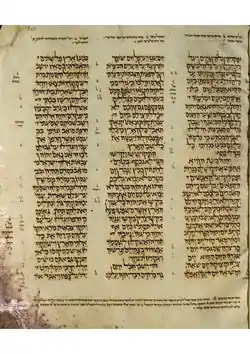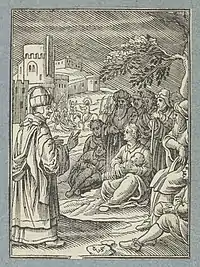Zechariah 9
Zechariah 9 is the ninth of the total 14 chapters in the Book of Zechariah in the Hebrew Bible or the Old Testament of the Christian Bible.[1][2][3] This book contains the prophecies attributed to the prophet Zechariah, and is a part of the Book of the Twelve Minor Prophets.[4] This chapter is a part of a section (so-called "Second Zechariah") consisting of Zechariah 9–14.[5] It concerns about the advance of an enemy (cf. oracles in Amos and Ezekiel), but God defends Jerusalem and his king will triumphantly enter the city to bring peace among all nations.[6] This chapter also contains a continuation of the subject in the seventh chapter.[7] The part about the king's entry into Jerusalem (verses 9 and 10) is quoted in the New Testament, especially in the event of Jesus' triumphal entry into Jerusalem (Matthew 21, John 12).[6][8]
| Zechariah 9 | |
|---|---|
 The last five extant folios of the Book of the Twelve Minor Prophets in the Aleppo Codex (10th century), which include parts of Zephaniah and Zechariah, and the entire text of Malachi. | |
| Book | Book of Zechariah |
| Category | Nevi'im |
| Christian Bible part | Old Testament |
| Order in the Christian part | 38 |
Text
The original text was written in the Hebrew language. This chapter is divided into 17 verses.
Textual witnesses
Some early manuscripts containing the text of this chapter in Hebrew are of the Masoretic Text, which includes the Codex Cairensis (from year 895), the Petersburg Codex of the Prophets (916), Aleppo Codex (930),[lower-alpha 1] and Codex Leningradensis (1008).[10][11]
There is also a translation into Koine Greek known as the Septuagint, made in the last few centuries BCE. Extant ancient manuscripts of the Septuagint version include Codex Vaticanus (B; B; 4th century), Codex Sinaiticus (S; BHK: S; 4th century), Codex Alexandrinus (A; A; 5th century) and Codex Marchalianus (Q; Q; 6th century).[12] Fragments containing parts of this chapter (a revision of the Septuagint) were found among the Dead Sea Scrolls, i.e., Naḥal Ḥever 8Ḥev1 (8ḤevXIIgr); late 1st century BCE) with extant verses 1–5[13][14][15]
Foreign Nations Oracles (9:1-8)
This section contains some 'wisdom influence', such as the 'eye' motif (cf. Job 42:5), which 'binds the book together', in verses 1 and 8, as well as many allusions to earlier prophets including Amos, Ezekiel, and Isaiah.[16] There is a geographic movement from north to south as the word of the Lord moves from Syria or Aram (verse 1) to Jerusalem ("my house"; verse 8).[8]
Verse 1
- The burden of the word of the Lord in the land of Hadrach, and Damascus shall be the rest thereof: when the eyes of man, as of all the tribes of Israel, shall be toward the Lord.[17]
Verse 8
- Then I will encamp at my house as a guard,
- so that none shall march to and fro;
- no oppressor shall again march over them,
- for now I see with my own eyes.[19]
- "As a guard" (ESV; KJV: "because of the army"): from Hebrew: מצבה, a hapax legomenon; it can be read as מִצָּבָה (mitsavah), following Masoretic text, from נָצַב, natsav, "take a stand", or מַצֵּבָה (matsevah, "pillar"); bearing 'the idea of the Lord as a protector'.[20]
King of peace (9:9–10)
This section serves as a 'linking passage', the first of several passages (10:1-2; 11:1-3; 11:17; and 13:7-9) which 'bind chapters 9—14 together' with some distinct characteristics: 'compact, metrical, uses opening imperatives and vocatives, and links the material that precedes and follows it'.[16] It describes "the king of peace", drawn partly from 'Jacob's blessing of Judah' (Genesis 49:10–11) and partly from Psalm 72:8.[16]
Verse 9

- Rejoice greatly, O daughter of Zion;
- shout, O daughter of Jerusalem:
- behold, thy King cometh unto thee:
- he is just, and having salvation;
- lowly, and riding upon an ass,
- and upon a colt the foal of an ass.[21]
- "Ass" (KJV; NRSV: "donkey") and "colt": point to one animal in the 'style of Hebrew parallelism' (cf. Genesis 49:11; John 12:14–15), indicating 'peaceful intentions', in contrast to "horse" (or "war-horse") in verse 10.[8]
New Testament authors see this verse as a prophecy to Jesus' triumphal entry into Jerusalem on Palm Sunday as quoted in Matthew 21:5; John 12:15).[22]
Verse 10
- And I will cut off the chariot from Ephraim,
- and the horse from Jerusalem,
- and the battle bow shall be cut off:
- and he shall speak peace unto the heathen:
- and his dominion shall be from sea even to sea,
- and from the river even to the ends of the earth.[23]
God will save his people (9:11–17)
This part pictures God as a warrior who brings 'ultimate victory to his oppressed people against the Greeks'.[16]
See also
Notes
- Aleppo Codex at present only contains Zechariah 9:17b–14:21.[9]
References
- Collins 2014, p. 428.
- Hayes 2015, Chapter 23.
- Zechariah, Book of. Jewish Encyclopedia
- Mason 1993, pp. 826-828.
- Coogan 2007, p. 1357 Hebrew Bible.
- Mason 1993, p. 827.
- Robert Jamieson, Andrew Robert Fausset; David Brown. Jamieson, Fausset, and Brown's Commentary On the Whole Bible. 1871.
 This article incorporates text from this source, which is in the public domain.
This article incorporates text from this source, which is in the public domain. - Coogan 2007, p. 1364 Hebrew Bible.
- Boda 2016, p. 3.
- Würthwein 1995, pp. 35-37.
- Boda 2016, pp. 2-3.
- Würthwein 1995, pp. 73-74.
- Dead sea scrolls - Zechariah
- Fitzmyer 2008, p. 128.
- Boda 2016, p. 5.
- Larkin 2007, p. 613.
- Zechariah 9:1 KJV
- Note [b] on Zechariah 9:1 in NET
- Zechariah 9:8 ESV
- Note [b] on Zechariah 9:8 in NET
- Zechariah 9:9 KJV
- Note [c] on Zechariah 9:9 in NET Bible.
- Zechariah 9:10 KJV
- Coogan 2007, p. 1365 Hebrew Bible.
Sources
- Boda, Mark J. (2016). Harrison, R. K.; Hubbard, Jr, Robert L. (eds.). The Book of Zechariah. New International Commentary on the Old Testament. Wm. B. Eerdmans Publishing. ISBN 978-0802823755.CS1 maint: ref=harv (link)
- Collins, John J. (2014). Introduction to the Hebrew Scriptures. Fortress Press. ISBN 9781451469233.CS1 maint: ref=harv (link)
- Coogan, Michael David (2007). Coogan, Michael David; Brettler, Marc Zvi; Newsom, Carol Ann; Perkins, Pheme (eds.). The New Oxford Annotated Bible with the Apocryphal/Deuterocanonical Books: New Revised Standard Version, Issue 48 (Augmented 3rd ed.). Oxford University Press. ISBN 9780195288810.CS1 maint: ref=harv (link)
- Fitzmyer, Joseph A. (2008). A Guide to the Dead Sea Scrolls and Related Literature. Grand Rapids, MI: William B. Eerdmans Publishing Company. ISBN 9780802862419.CS1 maint: ref=harv (link)
- Hayes, Christine (2015). Introduction to the Bible. Yale University Press. ISBN 978-0300188271.CS1 maint: ref=harv (link)
- Larkin, Katrina J. A. (2007). "37. Zechariah". In Barton, John; Muddiman, John (eds.). The Oxford Bible Commentary (first (paperback) ed.). Oxford University Press. pp. 610–615. ISBN 978-0199277186. Retrieved February 6, 2019.CS1 maint: ref=harv (link)
- Mason, Rex (1993). "Zechariah, The Book of.". In Metzger, Bruce M; Coogan, Michael D (eds.). The Oxford Companion to the Bible. Oxford University Press. ISBN 978-0195046458.CS1 maint: ref=harv (link)
- Würthwein, Ernst (1995). The Text of the Old Testament. Translated by Rhodes, Erroll F. Grand Rapids, MI: Wm. B. Eerdmans. ISBN 0-8028-0788-7. Retrieved January 26, 2019.CS1 maint: ref=harv (link)